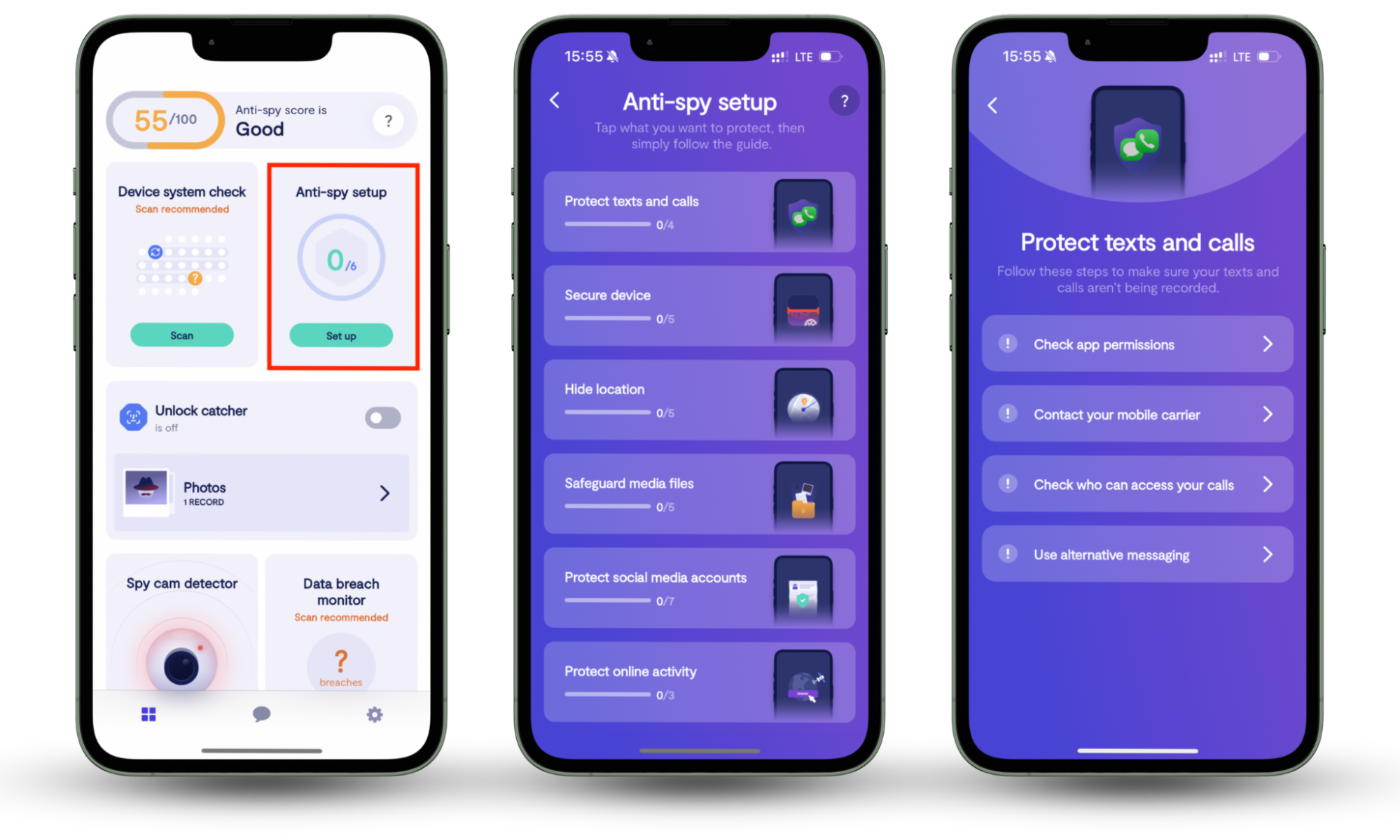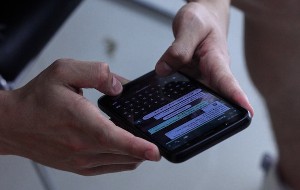Table of contents
- What is government spying?
- Why does the government spy on us?
- Is it legal for the government to watch people?
- Federal agencies that can watch you
- How to know if the government is watching you
- How does the government spy on you?
- How the government uses social media to collect data
- How to protect yourself from government surveillance
- Conclusion
What is government spying?
Government spying definition
Also known as government surveillance, government spying refers to the observation of an individual or group by a government to collect information. The surveillance is typically carried out for an extended period.
Governments can spy on individuals and groups using surveillance technologies and by observing the following:
- Messaging apps
- Social media platforms
- Webcams
- Phone calls
- Internet activity
- Data and Wi-Fi networks.
Yes, the government spying on phone calls is common. In the past, government surveillance was primarily associated with foreign intelligence and national security, but today it’s also directed at monitoring domestic citizens. Both US and UK governments, for instance, engage in monitoring their own citizens.
Is someone spying on your phone?
Learn the simple tricks to find out if someone is spying on my phone.
Why does the government spy on us?
The thought of being spied on can be alarming, especially when it’s the government watching you. There are multiple reasons why the government spies on citizens:
- Fighting terrorism. The government may monitor citizens to identify and combat terrorism. To achieve this, it often collects data from telecommunications services and Internet Service Providers (ISPs), typically in bulk and frequently including metadata. This information helps law enforcement investigate, prevent, and prosecute terrorist activities.
- Preventing crime and unrest. The government can spy on individuals to help fight crime and to make the country safer. The FBI can secretly place a wiretap on a person’s device as part of a criminal investigation. However, it doesn’t have to prove probable cause or have reasonable suspicion that a crime has been committed.
- Protecting national security. The NSA monitors, collects, and processes information to aid in foreign intelligence, domestic intelligence, and counterintelligence activities. It may do so without a warrant.
- Law enforcement investigations. Law enforcement now has more resources available to help fight crime than undercover cops and agents. The advancement of technology means that crime suspects can be monitored remotely with the use of technology.
- Political intelligence. The government may monitor citizens to counter the threat of espionage. For example, the UK government’s MI5 Security Service has a branch dedicated to tackling espionage to foil the plans of anyone passing on sensitive information and equipment to other countries.
Note
You don’t have to be on the FBI’s most wanted list, a known terrorist, or an enemy of the state to be monitored by the government. The government collects information about regular citizens, too. That’s why it’s important to be proactive about protecting your privacy.
Consider using reliable anti-spying software to keep the government out of your business, at least as far as it depends on you. The Clario Anti Spy app can help you achieve this, especially if you’re wondering if someone is spying on you.
Clario Anti Spy’s Anti-spy setup helps you put anti-spying protections in place to prevent bad actors from monitoring your phone and accessing your sensitive information. It includes various sets of handy checklists to make implementing these protections easier. All that’s required of you is selecting a category, following the on-screen prompts, and repeating the process until you’ve set everything up.
Follow the simple guide below to prevent spying with Clario Anti Spy’s Anti-spy setup:
- Download Clario Anti Spy on your smartphone and set up an account.
- In the Anti-spy setup section, hit the Set up button. This will open a list of recommendations to follow.
- Ensure you implement all the items on the checklists to secure your phone against spying.

Is it legal for the government to watch people?
It is illegal for the government to watch people without their permission, as it infringes upon their right to privacy. However, certain laws permit government agencies to monitor US citizens.
For example, according to the American Civil Liberties Union (ACLU), the Patriot Act allows the FBI to secretly wiretap or physically search US citizens to obtain evidence in a criminal case. In fact, they can do so without proving probable cause, as required by the Fourth Amendment.
Federal agencies that can watch you
Federal agencies that can spy on you include:
- National Security Agency (NSA)
- Federal Bureau of Investigation (FBI)
- Department of Homeland Security (DHS)
- Homeland Security Investigations (HSI)
- US Customs and Border Protection (CBP)
- Immigration and Customs Enforcement (ICE).
How to know if the government is watching you
Below are the signs that the government is spying on you:
- You keep your webcam on
- You use a smart TV
- Your computer or phone has been hacked
- You’re often around CCTV cameras in public.
If you identify with any of the scenarios above, it doesn’t guarantee that the government is spying on you. However, it means it’s a possibility, especially as technology makes it easier for the government to watch you without you knowing.
How does the government spy on you?
The government can spy on you through various means. These include emails, text messages, online browsing, and social media. The NSA spies on you through hacking, backdoors, Big Tech, and more.
Here’s how the NSA can monitor you:
- Obtaining your data from Big Tech. PRISM is an NSA program that collects customers’ data related to internet communications. The NSA’s PRISM program requires Big Tech companies to hand over this data, which includes documents, emails, and messages. These companies include Google, Microsoft, Apple, Facebook, Yahoo!, YouTube, Skype, and more.
- Accessing your phone records. The NSA has accessed the phone records of US citizens in the past, so this could happen to you. According to the New York Times, the NSA claimed it discovered in 2018 that it had unknowingly and illegally obtained the phone and text records of 600 million people. It blamed the situation on an unnamed telecommunications provider.
- Hacking your tech devices. The NSA’s Tailored Access Operations is a hacking unit focused on exploiting security vulnerabilities in consumer devices. It also hacks into vulnerable IT systems.
- Using backdoors on your devices. The NSA can intercept your device through backdoors. It works with manufacturers to build backdoors, which are vulnerabilities that give you access to a device. But that’s not all; the NSA also intercepts device shipments to add backdoors to phones and computers. This is all done to make it easier for the government department to spy on citizens.
Definition: backdoor
A backdoor sounds exactly like what it is; it’s the process of bypassing a device’s encryption or authentication requirements to gain access or control it secretively. In simple terms, it’s the process of gaining unauthorized access to a device, as you would through someone’s back door, to avoid detection.
- Tracking your movements. We’ve mentioned that the FBI can watch you through CCTV cameras. The NSA can track you using your cell phone tower pings anywhere you go. What’s more, you don’t have to be targeted; the NSA can monitor you through cell phone towers because of your association with someone they may be looking into.
- Tapping internet lines. It’s common knowledge that your internet devices can be hacked. The NSA can tap internet lines to spy on you. It can do this on its own or have it done by a third party.
- Spying on tracking cookies. Browser cookies help improve your browsing experiences, save your preferences, and show you relevant ads. However, the NSA can obtain the data from your cookies to target people vulnerable to hacking.
Not sure how browser cookies work?
Learn everything you need to know about browser cookies.
- Hacking foreign companies. The spying tactics of the NSA go beyond the US. In the past, the NSA has breached the telecommunications networks of providers in foreign countries, including Germany and Brazil, to obtain phone and text records.
- Spying on foreign leaders. The NSA can ask the White House, Pentagon, and State Department for the personal information of foreign leaders it wants to watch closely. They can tap their phones to monitor their conversations without their knowledge.
- Monitoring what you buy. The NSA can see your credit card purchases and history. Therefore, it can track your financial activity, including international wire transfers.
How the government uses social media to collect data
The US government can collect information on social media as part of ongoing investigations, identifying and monitoring threats, situational awareness, and checking out travelers and immigrants coming into the country.
Can someone spy on Facebook Messenger? Through social media, government agencies have an easy way to collect information about individuals. People take for granted how much data they reveal about themselves on their social media profiles. They don’t realize that by posting about yourself, you make it easy for others to monitor you, including the US government.
Below are the various reasons why the US government may use social media to collect information about you:
- Monitoring situations. Government departments monitor social media platforms to get first-hand information and updates about current events. This allows those officials to come up with official responses based on the information gathered. To that end, they track keywords related to current events and breaking news on social media apps and platforms.
- Identifying threats. Similar to monitoring situations, the government monitors social media to track specific individuals or identify threats related to public safety and more. If the user being monitored has their social media accounts set to public, the government can easily and frequently watch them there. The difference between monitoring situations and identifying threats is that the former focuses on threats on a broader scale, while the latter focuses on tracking individuals who pose a threat.
- Screening and vetting travelers and immigrants. The US places importance on managing threats coming into the country. So the government may screen incoming travelers and immigrants to ensure they pose no threat to the country and verify their information upon entering it. The government can also track travelers while they’re in the country.
- Investigating cases. Investigating criminals and civil cases is a lot of work and much of it entails traveling, on-the-ground work, and working with documents. Social media, however, makes it so much easier. Government officials can spy on suspects or anyone involved in a case on social media from behind a desk. The FBI is an example of a government department that uses social media for investigative work. They don’t have to hack the targets’ accounts, either; they can collect information from their posts, especially if they’re active social media users.
How to protect yourself from government surveillance
Government spying is real, but there are ways to protect yourself against it. Here are some methods you can implement to protect yourself from government monitoring:
- Educate yourself about the law
- Use best practices
- Use a VPN service
- Use an app that encrypts your messages, like WhatsApp
- Go private on social media
- Reconsider your use of smart devices.
Do you believe someone is stalking you online? Learn how to stop cyberstalking.
According to Fox Business, US Senator Ted Cruz and Senator Maria Cantwell presented the Smart Devices Act to the US Senate in July 2023. This bill would require the Federal Trade Commission (FTC) to make it mandatory for smart devices to let customers know if they include audio or visual recording components.
Conclusion
We talk a lot about hackers spying on you through your devices, but they’re just one group of culprits. The government can monitor you, too, often without your knowledge. If you use social media, a phone, a laptop, a computer, or other technology, the government can watch you through those devices and platforms.
You have a right to privacy. Use the tips in our article to stay alert and protect yourself from government spying. Learn what the law allows and practice safe habits to protect your privacy. Use the checklists in Clario Anti Spy’s Anti-spy setup tool to protect yourself from being watched by the government or anyone else who may be keen to get their hands on your data.


